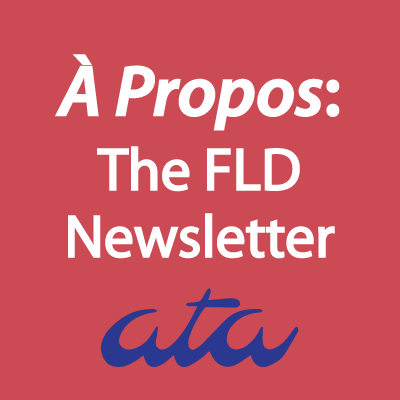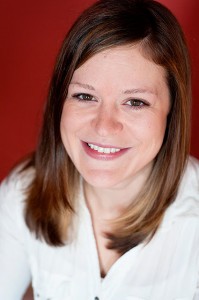
Find our more about our Proust Questionnaire!
Corinne McKay, CT, is a former administrator of the French Language Division and current President-Elect of the American Translators Association.
How did you get involved in translation? Well, maybe it was destiny, because my birthday is International Translation Day (no kidding!). But after getting a Master’s in French Literature and teaching high school French for 8 years, I had a baby and wanted a change. So in 2002 I sat at the kitchen table with my baby daughter and the phone book, and started cold-calling translation companies to find out how to apply. 13 years later, here I am!
What subject areas do you translate? Mostly international development, corporate communications and books. I translate for internationally-funded development projects in West Africa and Haiti, for French universities and law firms, and I recently translated two books: a murder mystery set in Egypt and a memoir by a Sherpa written in the 1950s.
What is your greatest strength as a translator? I’m persistent: whether it’s researching a term, or finding a colleague to answer a question, or finding a new client, it takes a lot to crush my spirit!
If you could translate anything in the entire world and get paid for it, what would it be and why? I love translating outdoor adventure and mountaineering memoirs (kind of a niche within a niche), and fortunately the French and Swiss write a lot of them! My absolute dream project would be to translate Louis Lachenal’s Carnets du Vertige, a memoir about the first expedition to successfully summit an 8,000-meter peak. So if anyone has an “in” with his heirs, let me know!
Please tell us something about one of the most interesting projects you have ever worked on. The text of the Sherpa memoir I just translated was like a game of telephone, because the Sherpa author was illiterate in his own language and didn’t speak French. So he dictated the book in English to one of the other expedition members, through an interpreter; then yet another person translated it into French, for reasons unknown. I’d love to see how closely my translation resembles the “original” English!
What linguistic resource (dictionary, glossary, website, etc.) would you like to share with our readers? Linguee: lots of people probably use it already, but it’s great for researching words or phrases in context.
Do you have a favorite word or phrase in French or English that you’d like to share? When I started taking French in middle school, our textbook included a photo essay called “Le beau paysage sauvage du Mont Saint-Michel.” Mont Saint-Michel is still one of my favorite places in the world, maybe because of that story, so the phrase pops into my head a lot!
Outside of works on T&I, is there any book (fiction or non-fiction) that you enjoyed reading that you would like to recommend to others? It can be in either English or French. I don’t read much fiction, much less historical fiction, but I became absolutely addicted to Hilary Mantel’s Henry VIII series, including Wolf Hall and Bring Up the Bodies. I regularly stalk Amazon for the third volume in the series, which is supposed to come out this year.
Do have a funny “food” translation story you’d like to share? Tell us about it! I find ordering coffee in France or Switzerland to be surprisingly difficult, and it’s a major issue because I am a caffeine enthusiast! It always strikes me as odd that in the US, we call espresso drinks by Italian names, but not the Italian names that Italians use; and then there’s the “no cappuccino after dinner” custom to deal with. But it’s hard to go wrong with un grand crème at any time!
What is something about you that has nothing to do with translation that is interesting or surprising? I play the Renaissance lute (on a very amateur level!). I started about two years ago and now play in a little early music ensemble with two women who’ve taken me on as their community service project; but I don’t dress up in Renaissance costumes (yet!).
What is your favorite quote? “To achieve great things, two things are needed; a plan, and not quite enough time.” – Leonard Bernstein
What have we not asked that you’d like to answer? Why do I love the FLD? That’s a good question! Because it’s given me a network of wonderful colleagues who will help with terminology questions at any hour of the day or night, because it helped me build the confidence to become more involved in ATA, and because the FLD always has the best division dinner at the conference!
Thanks, Corinne!


